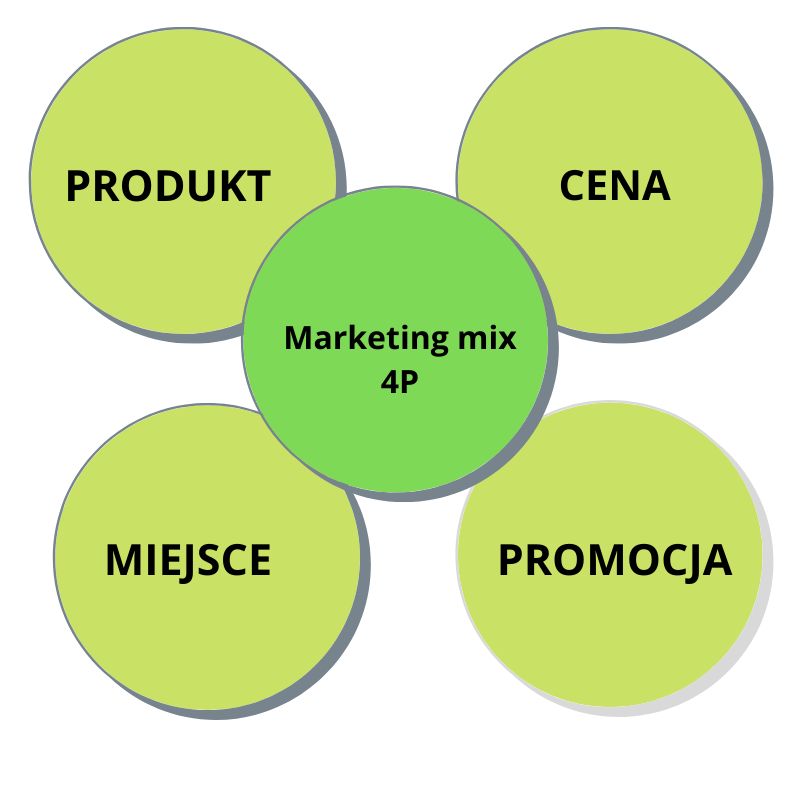Marketing concepts have evolved with the development of the market. Initially, the role of the customer in product development was minimal. Today, the customer is at the center. Marketing concepts that have emerged over the years are a manifestation of various business philosophies aimed at satisfying the needs of customers at different times. Because regardless of the market era, the basic assumption of all marketing concepts is to acquire and maintain satisfied and profitable customers.
- Marketing concepts - definition
- Marketing concepts - beginnings
- Innovative marketing concepts
- Innovative Marketing Concepts
- Marketing and sales concepts
- Marketing and sales synergy
- Marketing mix in the old and new sense
- Market oriented marketing concept
- Marketing concepts and their application
- What are modern marketing concepts characterized by?
The concept of "marketing concept" first appeared in the General Electric Company in 1952. Since then, marketing concepts have been consistently redefined. There are two main schools of thought in which marketing is considered either a philosophy or a function. The concept of marketing treats marketing as a philosophy. It represents business thinking and started to develop from 1850. Let's follow how it has evolved.
Focus on your business.
We will take care of promoting it.
Marketing concepts - definition
In general, each concept is a general plan of action, idea, project, way of understanding something and solving a problem. It is no different in the area of marketing - we can define various marketing concepts.
The definitions explain this concept in many ways, based on different views of the term. Some say that marketing concepts are strategies adopted by organizations that are implemented to achieve profits, increase sales, and stand out from the competition. In this area, concepts are distinguished due to various goals - product, sales, production, marketing and social concept of marketing. They are conducted in accordance with the philosophy of effectiveness and efficiency.
On the other hand, other entities focus on changes that have undergone several decades of marketing concepts. This definition emphasizes the beginnings of marketing, which focused primarily on the mass production of goods, up to the evolution towards the consumer, i.e. a modern approach based on meeting his needs. Each approach to the definition has a different meaning, so a broad understanding of the marketing philosophy will help you implement the appropriate actions.
Marketing concepts - beginnings
The first marketing concept was production philosophywhich ruled the market from the 1850s to the 20th century. It was the period of the industrial revolution. There has been an increase in electricity production and the development of rail transport. During this time, assembly lines and mass production appeared. New technologies and new ways of using labor have made it possible to produce goods more efficiently. The production philosophy is based on the assumption that consumers will prefer a product that is available and very affordable. Therefore, companies focused on improving products and efficiently distributing goods.
The marketing concept that was dominant at the beginning of the 20th century and lasted until the 1930s was product philosophy. It was assumed that consumers would prefer the product for its quality, performance and innovative features. According to this concept, the company knows its product best. She knows what works for design and manufacturing a product and what does not. Since the company has a great deal of knowledge and skills in product development, it also assumes that it knows what's best for the consumer. On the one hand, this concept forced companies to improve product quality and introduce new features. However, they were implemented without consulting the client.
Next, sales philosophy, was the concept of companies that preceded the product age. It had the shortest dominance period compared to the two previous ones, from 1930 to around 1950. The sales philosophy was to create a department within the company that would be solely responsible for selling products, while the rest of the company could concentrate on the production of goods. The sales concept was oriented to the fact that the company could sell any product it produces. As long as it uses the appropriate marketing techniques such as advertising and personal selling. Marketing concepts based on a sales philosophy assumed that consumers were unlikely to purchase the product. Unless they are aggressively persuaded to do so. So the 'hard selling' approach was prevailing.
Innovative marketing concepts
The world is changing all the time. And so does the consumer's awareness. Today's customers are looking for original, unique products, they want to stand out, they want to have plenty to choose from. Changing customer awareness has influenced the business environment, which is now value-driven. The concept of marketing has evolved. Traditionally, marketing meant activities aimed at supporting sales and influencing the sender.
The new approach focuses on customer satisfaction. The goal of marketing is to create products that will be valuable to consumers, and satisfy their needs and desires. Currently, the mere matching of products to the target group by meeting the functional and emotional expectations of customers is no longer enough. More is expected of brands. The products are to revolutionize the world and change it for the better.
Innovative Marketing Concepts
It is worth starting your considerations on innovative marketing concepts with marketing 1.0 - a concept presented by Philip Kotler. On the market at that time, the mere fact of the availability of a given product and the vision of having it were enough to drive sales. Marketing was practically non-existent. The market was product focused.
A little later (with the beginning of the development of information technology), marketing 2.0 was born. Consumers have gained access to a wide variety of information on individual goods. They could look for replacements and compare them with each other. They gained greater market awareness and thus became more demanding. Marketing 2.0, as a customer-oriented concept, was to respond to the need for diversity and meet customer expectations. In marketing 2.0, the functional and emotional value of the product mattered.

The third stage of the evolution of marketing concepts is marketing 3.0, i.e. the era of values. Firms faced clear consumer needs and desires. They had to adapt their marketing and communication strategies to the changing realities. The spiritual and sentimental ones have been added to the functional or environmental values important in marketing 2.0. Marketing was introduced into the sphere of human aspirations. Objective value marketing is to create a better world.
The latest marketing concept is marketing 4.0 from 2017 - otherwise virtual marketing. The approach combines online and offline communication between businesses and consumers. It combines artificial intelligence with other technologies. The idea behind the concept is "create tomorrow, today". Marketing 4.0 has a functional, self-creative, emotional and spiritual value. The recipient is aware, has a real impact on the market - he can co-create products.
The biggest change in defining marketing is the new understanding of strategy - from functional production and the need for things to value delivery. Marketing today is centered around higher values. It's not just about selling. There is more to it.
Marketing and sales concepts
Today it is easier to produce products than to sell them. Enterprises undertake a variety of activities aimed at learning about the preferences and requirements of current and potential customers - thanks to which they can adapt products to their needs as much as possible. It is also important how companies reach recipients and how they encourage them to buy the offered products - the better the communication strategy, the greater the chance of success.
Sales and marketing are two different concepts. The goal of marketing is to meet the expectations of customers by creating goods that respond to their needs. Marketing is about creating customer needs in the market, and then responding to these needs and communicating the value of the created product. In a nutshell, marketing is customer relationship management. The sale is related to the paid delivery of goods. It is the sum of organizational, financial, technical and legal activities.
One could say that the marketing function evolved from sales structures (see the first marketing concepts - production, product, sales; in the past, marketing was understood as sales support goods). Although marketing and sales are two different departments in each company, their cooperation may turn out to be very beneficial. Many companies prepare separate strategies for sales and marketing. This is quite a mistake. According to MarketingProfs, companies where marketing and sales are closely related are able to successfully retain customers and record higher sales.
The CSO Insights research shows that cooperation and dynamic management of sales and marketing processes allow for better commercial results - salespeople much more often achieve their sales goals. It can be concluded that the compliance between marketing and sales gives the potentially the greatest chance for a quick and stable improvement of business results - improvement of marketing ROI, increase in sales efficiency, increase in revenues and profits.
Marketing and sales synergy
How to build a synergy of marketing and sales? The key to success is a joint sales and marketing strategy. To develop it, first of all, you need to define and analyze the target group. Customer segmentation and determining the acceptable cost that the marketing department can spend on obtaining a lead is also of great importance.
It is also worth defining the segments to which the sales department has limited access and the products whose sale can be automated. Another important step is to define the customer's purchasing cycle and customer journey. Finally, it is necessary to analyze the products sold, divide the roles and define the communication strategy with the customer.

The sales and marketing plan should contain information on:
- the transfer of a potential customer by marketers to the sales team,
- monthly number of leads,
- quality and characteristics of leads.
Marketing and sales departments should remain in constant contact.
Marketing mix in the old and new sense
Marketing activities will not bring the expected results if they are not properly planned. The marketing plan should take into account the goals that the company wants to achieve and the instruments that will enable it to achieve these goals. The set of instruments is known as the marketing mix.
Marketing-mix is a set of interrelated elements that together create phenomena taking place on the market. The formula includes all factors that the company can use to shape the demand for the offered products by shaping and satisfying the needs of buyers.
Marketing mix has several concepts. The oldest of these is the definition of 4P, created by McCarthy. The 4P concept consists of such elements as:
- price (price) - the amount of money that the customer pays for the product,
- product - products offered by the company,
- place (place / distribution) - the company's activities thanks to which the product is available on the market,
- promotion - activities aimed at informing about the advantages of a product, and thus persuading consumers to buy.
For today's market, the 4P concept is no longer relevant.
The traditional understanding of this concept is not enough. The development of marketing resulted in the extension of the formula to 7P, adding three elements to it: people, physical evidence and process.
Marketing-mix 7P takes into account the importance of human resources - including employees who contribute to the direct sale of products and influence the development of the company.
A tangible certificate is a factor that influences the identity of the company and its perception by customers - e.g. logo, website, dress code of employees, etc. The process is an activity related to the quality of services - the process increases the effectiveness of the company and affects the level of customer satisfaction.

Another form of marketing mix is the 4C concept, which proposes looking at marketing activities from the customer's perspective. The 4C formula consists of such elements as:
- customer value (customer needs),
- cost (cost to the customer),
- convenience (convenience of purchase),
- communication (company-customer communication).
The 4C concept is based on the benefits that the product will provide to the customer. Marketing activities are focused on meeting the personal needs of consumers.
Market oriented marketing concept
Marketing concepts have been developing since the 1950s until today, assuming that the starting point of any marketing process is the customer's needs and desires, not aggressive sales. The underlying premise of the marketing philosophy is that the market should produce what it can sell, rather than trying to sell what it produces. Marketing concepts in this case focus on the needs and desires of the buyer, not the needs of the seller and the product.
The main task of marketing is not only to convince the customer to buy, but also to satisfy his needs, according to the principle that goods are produced for this purpose, not only to sell them. Today, companies increasingly first look for the unconscious consumer needs and then manufacture goods to meet them. Along the way, incl. thanks to actions public relations, make customers aware of these needs.
The market-oriented marketing concept recognizes that the company's knowledge and skills in product design may not always match the needs of customers. Thus, the business orientation has shifted from product to market. It was also noticed that even a good sales department is not able to sell every product if it does not meet the needs of consumers. In addition, it has been noticed that when customers have many choices, they will choose the product that best suits their needs. People began to realize how important it is target group and suitable communication channelsto reach your target audience.
Marketing concepts and their application
Marketing concepts based on the production philosophy assumed that since consumers are most interested in the availability of products at low prices, the marketing goals are cheap, efficient production and intensive distribution. The production philosophy proved successful in companies in the 1850s and allowed them to achieve their business goals. Today, such a business orientation can only make sense if the company's goal is to expand the market.
In turn, the success of the product philosophy was mainly due to the level of technology in the times in which it dominated. As demand exceeded supply, the marketing concepts of that time placed emphasis on production, not the customer. Most of the goods were so limited that firms could sell whatever they produced. Therefore, they did not have to consult with consumers and reckon with their opinion.
While some companies' marketing concepts may still be product-oriented, this mindset is not popular in today's business environment. A product philosophy often leads a company to focus on the product and not on the needs of consumers. And today, as never before, they must be satisfied. This approach leads to "marketing shortsightedness". Given the nature of customers and the business environment, the product philosophy is ineffective.

The increase in the quantity and types of products on the market led to competition which eventually led to the end of product shortages and the emergence of surpluses. For this reason, companies have started using advertising and personal sales in an effort to reduce inventory and cash in goods. The sales philosophy has also enabled parts of the organization to continue to focus on the product through the product philosophy. In addition, the sales era was characterized by the approach that the sales or marketing department could sell whatever the company produced. Apart from the aggressive approach to sales, the belief was that sales was the company's goal, not customer satisfaction. The sales concept takes the perspective "from the inside", as it were. It focuses on the company's existing products and requires intensive efforts to obtain profitable sales. It focuses primarily on acquiring customers here and now - getting short-term sales without reflecting on who is buying and why. Concept Customer Lifetime Value in this case it does not matter.
What are modern marketing concepts characterized by?
While marketing concepts are a recipe for fighting competition, old habits can be difficult to shed. Therefore, even until now, some companies are still convinced that in order to be successful, they must use a "hard selling" approach. Meanwhile, marketing concepts should start from a well-defined market. Focus on customer needs and integrate all marketing activities that affect them. Profits will come by creating lasting relationships with customers, based on their satisfaction.
Sales focus on the needs of the seller, marketing - on the needs of the buyer. Selling is the need to turn a product into money. Marketing it is an activity aimed at satisfying the customer's needs with the help of the product and all the things related to its creation, delivery and final consumption. This philosophy is what is expected of market-oriented companies today. Companies that want to achieve business success. Despite the fact that new marketing concepts have evolved since the emergence of a marketing philosophy, acting with a view to meeting customer needs continues to dominate the creation and retention of profitable customers. And this is, after all, the primary goal of all enterprises.
